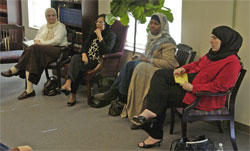Islam supports the fair treatment of women in education and the workforce, a panel of Islamic women from the Fort Worth community said Thursday.Saddyna Belmashkan, president of the Muslim Student Association, asked several members of her mosque, Masjid Al Ibraheemi, to discuss women’s rights in Islam as part of Thursday’s Professional Women in Islam panel discussion. Panelists answered questions for about one hour.
The status of women in Islam and the hijab were some of the other topics discussed by the panel as a part of the first annual Islamic Awareness Week.
Principal Michelle Nusrallah, pediatrician Keisha Shaheed, retired pathologist Sayeeda Selod and entrepreneur Alia Selim participated in the panel.
Keely Doering, a sophomore graphic design major, said she was interested in the panel because she wanted to learn about other cultures and religions.
All panelists agreed people would be surprised to find that Muslim women have several rights often misconstrued by the media. Nusrallah and Selod said education is paramount for Islamic women. Nusrallah, principal of Al-Hedayah Academy, an Islamic elementary school in Fort Worth, said it is important for parents to serve as a bride to society.
“Just like other American women, Muslim women, even if they decide to become stay-at-home mothers, have bachelor’s, master’s and doctorate degrees,” Nusrallah said.
Panelists started by discussing “covering,” the act of wearing the traditional Muslim veil, the hijab, and wearing modest clothing.
Selim, who is owner of an online travel agency, said she was nervous about starting to cover herself when she began attending the University of Texas at Arlington.
“I thought it would have a negative effect,” Selim said. “But nobody looked at me differently.”
Panelists also said society is gradually becoming more accepting of Islamic practices, such as wearing the hijab, praying and eating practices, and even traditional Muslim greetings.
“I’ve had people say ‘Assalaam Alaikum’ to me in the streets,” Selod said. “I’m glad they recognize me as a Muslim.”
Fidaa Elaydi, a freshman biology major, said she thought the event was well-received.
“I think Islamic Awareness Week as a whole has been successful,” Elaydi said. “I think it was great to have so many perspectives from different women.




